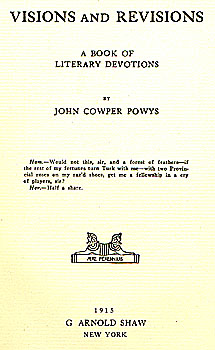It was on this ship [The Ivernia], and on this voyage, that I met for the first time, met as a complete stranger, my life-long friend and bosom-crony, Mr G. Arnold Shaw. Arnold Shaw has had a greater effect upon my life than almost any other person. He remains, for I am thankful to say when I recently visited him on Staten Island he was just the same, the most unmalicious, unvindictive, and, in many ways, unselfish character I have ever known..
(Autobiography)
G.Arnold Shaw (1884-1937) apart from being a very able manager for Powys's lectures, was probably also the most important of his publishers. He was the first to encourage and publish John Cowper, starting with the very first, The War and Culture: A Reply to Professor Münsterberg in 1914, a slim volume which was so successful that there was a second edition. Shaw, to promote the book, had also published a small four-page brochure where Powys explained his reasons for writing this book:
I have written this as a reply to Professor Münsterberg, because the professor's remarks have seemed to me deliberately designed to mislead public opinion in America about the issues at stake and deliberately designed to prevent a clear understanding of the real trend of modern German culture. I have sought to correct that plausible and superficial view of the Russian people as "the half-civilized eastern legions to whom we have taught the art of killing by machinery" - a view to which even so independent a thinker as George Bernard Shaw appears to have fallen a victim. I have also shown how inevitably this war has become a war of ideas; and how both Russia and England, whatever their original motives, are now fighting to preserve the most precious tradition that world-civilization has inherited - the tradition and culture of the Latin Race.
(The Ideal Ringmaster, A Biographical Sketch of G.A.Shaw, by Paul Roberts, The Powys Society publications, 1996)

This momentous decision Arnold Shaw took to become a publisher was paramount for John Cowper, who was at last galvanised into writing earnestly instead of just yearning to do so, as had been the case for so many years before. Shaw then went on to publish, in a short period of time, the following books:
Visions and Revisions in February 1915, Wood and Stone in November 1915, Wolf's Bane Rhymes in March 1916, One Hundred Best Books in June 1916, Rodmoor in October 1916, Suspended Judgments in December 1916 as well as Theodore's The Soliloquy of a Hermit, 1916, and another collection of poems, Mandragora in 1917. Most of these books were published at a time (1916) when John Cowper was at his lowest, almost on the verge of a nervous breakdown, probably exhausted by the efforts he sustained in writing 'at break-neck pace', while still lecturing, and all this in spite of a very bad health.
G.Arnold Shaw's achievements are remarkable and he had great flair for publicity to promote his authors. For he was also busy publishing works by other lecturers, less well-known now, but the Powys brothers made up the bulk of his publishing list. He was also very much taken by Theodore's works, even going to the length of announcing Mr Tasker's Gods (in fact published in 1925 but not by him) and he promoted Confessions of Two Brothers, published by Manas Press. Unfortunately his business began to decline before the end of the War: the books did not sell well and by 1920 he had lost most of his lecturers and was facing bankruptcy. He struggled bravely on for a number of years. Powys who also had financial problems, was forced to find a new agent but he remained in contact with Arnold Shaw and mentions him with gratitude in his Autobiography:
|
|